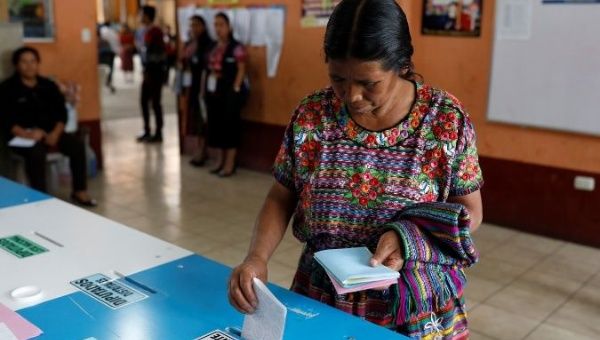
A woman votes at a polling station during the first round of Guatemala’s presidential election, in San Pedro Sacatepequez, Guatemala, June 16, 2019. Photo courtesy of Telesur
GUATEMALA CITY, June 17 (NNN-TELESUR) – Polls officially closed in Guatemala on Sunday as counting of the nearly eight million votes will begin in order to elect the successor of President Jimmy Morales.
A total of 19 candidates competed in the election, which is expected to yield no outright winner, forcing the top two vote-getters to face off in a second round on Aug. 11. If no presidential candidate wins more than 50% in Sunday’s first round election, a second round will be held in August.
Former First Lady Sandra Torres, 63, of the center-left National Unity of Hope (UNE) party leads the race to succeed Morales. Followed by veteran diplomat and former congressman Edmond Mulet, 68, who is competing for the Humanist Party, a new center-right grouping.
Voting centers opened at 7:00 am local time and closed at 6:00 pm local time. The winner will take office on Jan 14.
“All the voting boards were installed, even in the United States, the electoral process is being developed in its greater part within the framework of the law, of course, there are circumstances, which are not predictable in the electoral process within some municipalities like in San Jorge,” the President of the Supreme Electoral Tribunal, Julio Solorzano, Magistrate told reporters.
teleSUR’s correspondent Rolando Segura, who is in Guatemala covering the elections, reported that the country’s election board suspended elections in the municipality of San Jorge, Zacapa, due to security threats. Also, there were isolated reports of electoral irregularities.
“Ballots already marked or blank, without the corresponding signatures, bomb threats or coercion of voters are might null the electoral process where they are happening,” Human Right’s defender Oswaldo Samayoa said.
Despite a relatively calm election, violence has been reported. Segura said that “there has been a shooting 50 meters from a voting center in #Amatitlan, it caused two bullet wounds and chaos among those casting their the vote.”
A bomb threat was also reported in the municipality of San Marcos, Corral Grande.
Among those leading the polls is Sandra Torres — wife of ex-President Alvaro Colom, a representative of the social democratic party, National Union of Hope (UNE).
Following her is a great number of contenders led by Alejandro Giammattei of the newly established Vamos party, the former director of the jail system. Next is Roberto Arzu of the right-wing Pan-Podemos and finally Edmundo Mulet of the Guatemalan Humanist Party.
Presidential candidates Alejandro Giammattei and Sandra Torres registered their votes.
However, the Times-News reports widespread discontent, with voters saying they don’t trust any of the candidates, especially in light of a campaign plagued with scandals in which three candidates were disqualified for ethics violations.
There are big challenges for the next president of the country who will be expected to provide solutions to voters’ urgent concerns, which include a slowing economy, growing poverty, wild corruption and high levels of crime.
Corruption has always characterized the country’s political life. In an effort to address the problem, the government of Oscar Berger (2004-2008) invited the United Nations to create the International Commission against Impunity in Guatemala (CICIG) to inquire into corruption and crime in the country.
The progress made by the CICIG came to an end during Jimmy Morales presidency and his broken promises have produced immense dissatisfaction among Guatemala’s population.
In August, President Morales said he would end the commission’s mandate when it expires in September 2019.
At that time he also prohibited its director, Ivan Velasquez, from reentering Guatemala from his home country of Colombia and ordered the government to withhold the passports of over 30 of its employees.
This all unfolded just days after the commission was getting closer and closer to investigating the president and his National Party (NP), for illicit campaign financing during Morales’ 2016 run for head of state, among other charges.
NNN-TELESUR



